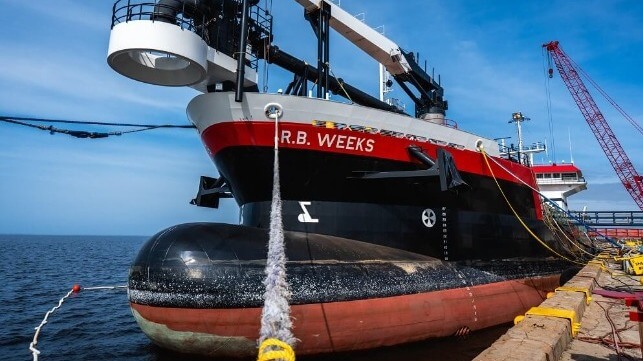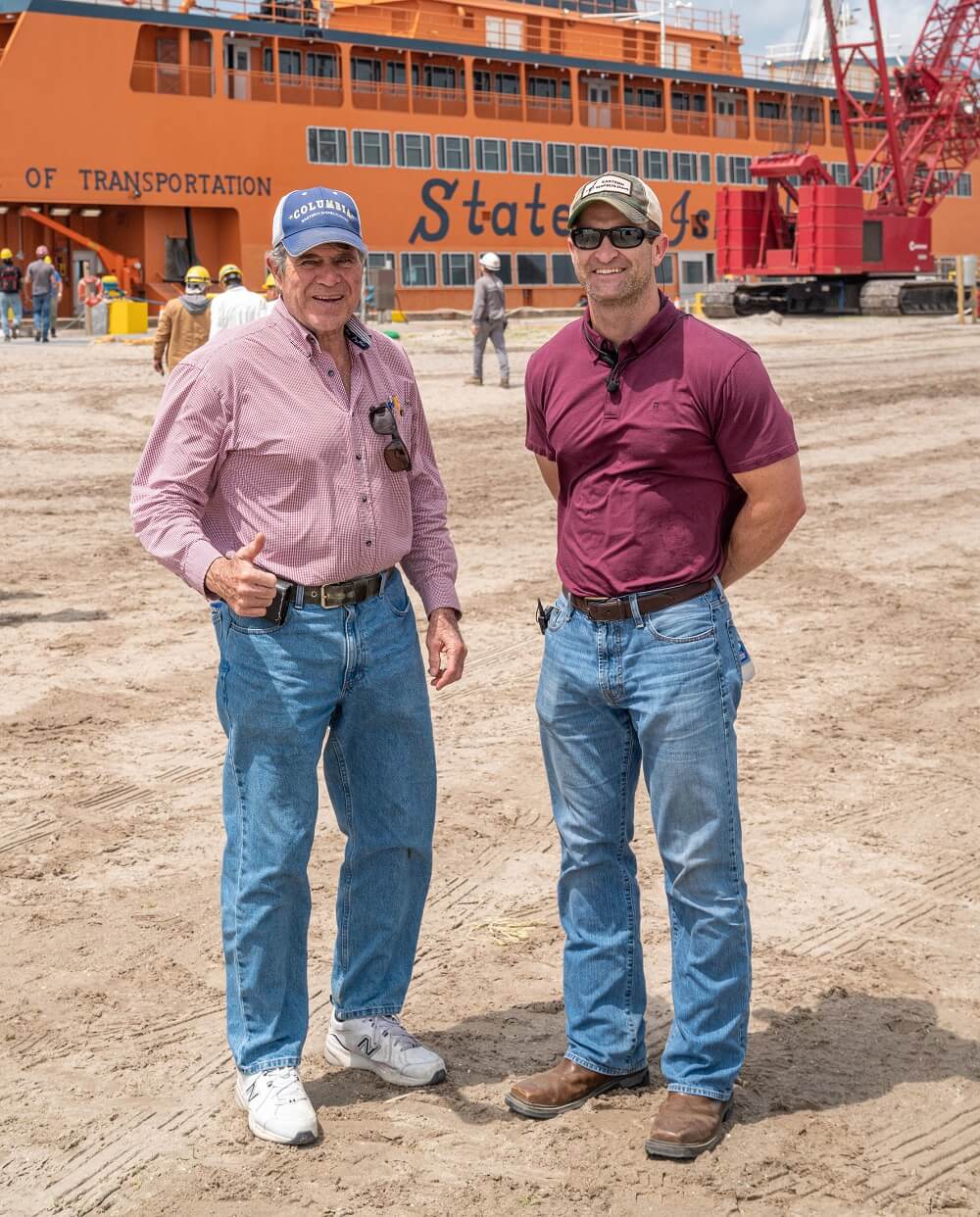Interview: Eastern Shipbuilding's Joey D'Isernia Takes Helm as New CEO

 Joey D’Isernia, longtime president of Eastern Shipbuilding Group, recently took up the role of CEO and Chairman of the Board at the family-owned firm. After more than 46 years in the role, founder Brian D’Isernia (far left) is retiring and handing over the leadership to the next generation. The Maritime Executive recently caught up with Joey to hear more about his life growing up in a shipyard and the lessons he picked up along the way.
Joey D’Isernia, longtime president of Eastern Shipbuilding Group, recently took up the role of CEO and Chairman of the Board at the family-owned firm. After more than 46 years in the role, founder Brian D’Isernia (far left) is retiring and handing over the leadership to the next generation. The Maritime Executive recently caught up with Joey to hear more about his life growing up in a shipyard and the lessons he picked up along the way.
Can you tell us about your early years at ESG, working with your father and your brothers? Perhaps any valuable lessons learned from Brian's leadership?
I grew up around the shipyard and spent quite a few Saturdays at work with my father when I was young. While fishing and throwing my castnet along the shoreline near the shipyard, I met a lot of the employees and established friendships with them early on. Although I was around the shipyard a lot growing up, I never really paid much attention to it as a career. After graduating with a degree in finance and not finding a job opportunity that excited me right out of the gate, I was approached by my father with a job offer to work at the shipyard. When he told me he wanted me to manage a project, I made sure he knew that I did not know what I was doing. His response was, “you will learn."
You can imagine how challenging it was managing a project and being surrounded by shipbuilding experts. Some employees liked and supported me, and some resented me. I realized early on that the best approach was to make it a practice to give what I wanted to get, as well as to show the people that I would never ask them to do something that I was not willing to do. I would say that is the biggest lesson Brian taught us was to treat everyone around you with respect, keep your promises, and lead by example.
What was it like leading ESG through Hurricane Michael and its aftermath? Is it fair to say that ESG is a stronger, more resilient company after having come through that trial?
Hurricane Michael was a true test of fortitude for our entire community. There is an unbreakable bond that forms through a trial of that magnitude. We are stronger and better than ever following that event. We remain grateful to our suppliers and partners who stepped in to help us get through that event.
We had just begun the OPC program, and we were determined to deliver on our promise. Priority was making sure our employees had a roof over their head and food and water in the immediate aftermath. Within two weeks we were operational again.
All three facilities have at least one land mass protecting them from Hurricanes. This proved critical when Hurricane Michael (the third strongest storm to ever hit the U.S. in terms of barometric pressure) directly hit our Panama City facilities.
The silver lining to receiving a direct hit from Hurricane Michael is that nearly all legacy structures and legacy infrastructure in our area has been replaced or is in the process of being replaced with new hardened assets, including many of those at our facilities.
Combine this with the fact that nearly all houses that were not destroyed, have been rebuilt with code compliant roofs, doors and windows, and I will submit that Panama City Florida is one of the most storm hardened areas in the U.S. This is a risk mitigator for future storms that will come.
What are your top priorities for ESG going forward?
My priority is to grow our business while maintaining the values that have sustained us for over 46 years. We employ 1600 people and are proud to be the largest company in NWFL. We want to contribute to the economic and environmental sustainability of our hometown and be a positive force in the national security complex.
It has been our strategy to successfully execute the U.S. Coast Guard Offshore Patrol Cutter (OPC) program while remaining competitive in the commercial shipbuilding arena.
In the last few years, with the support of our community, we have invested in the innovations and technology to compete at the top level of government shipbuilding programs. We aim to pursue those programs, while also delivering exceptional quality and service to our loyal commercial customer base.
What are the main sectors / areas of business you'd like to pursue in the coming years?
Eastern has successfully positioned itself as a go-to shipyard for diverse and complex shipbuilding projects on the government and commercial side. We have strategically walled off our government work from our commercial programs to maintain agility and speed for our commercial clients while meeting the government requirements to build national security assets.
We are actively bidding in targeted sectors where we have substantial experience and proven capabilities including programs for the U.S. government and for energy sector customers in oil, LNG, and offshore wind markets.
We are actively bidding multiple projects in the offshore wind market. These offshore wind support and installation vessels are complicated from a design and construction standpoint and our shipyard has a proven track record within the industry for completing large, complicated projects like these on time and within budget.
We also see a lot of potential in the industry’s push to convert existing assets and update aging fleets. We opened a dedicated yard in 2021 to provide topside repair and conversion services to both government and commercial customers. This is also the planned future site of ESG’s 15,000 ton drydock that will have certifications that allow for the drydocking of both commercial and government vessels.
On the government side, the United States needs to keep an active defense industrial complex of Tier 1 and Tier 2 shipyards to support fleet acquisition plans. We are well-positioned to meet these demands for the U.S. Navy and other USG partners. Our growth into government shipbuilding has earned us the small business of the year award from DHS and rank us near the top in regards to defense contracting in our state. We built our DCMA and DCAA certified business systems from the ground up and are one of the only Tier 2 shipyards with these certified business systems required to properly manage complex defense contracts. We have a dedicated yard with the capacity, capabilities, and standard of excellence to provide a low-risk solution for the U.S. government.
In a tight labor market, what attracts skilled employees to ESG and keeps them with the company?
We are respected in the industry for our strong family culture and customer success rate. We want to take care of our people, because they take care of our customers.
Our company culture is one of honesty and integrity. We earn the trust of our employees, customers, vendors, and other stakeholders by making promises and doing everything within our power to keep them.
We have invested in more than a dozen skilled training programs at the high school and college levels to foster a pipeline of future shipbuilders.
It is not easy to recruit and retain workers in this market, but through our BUILD Initiative we have invested in the resources and public engagement to attract talent that can support our growing programs.
Can you tell us about ESG's ties to the local community, and what ESG's investments / employment opportunities mean for the Panama City area?

that matters most
Get the latest maritime news delivered to your inbox daily.
I was born and raised in Panama City, Florida and all of our locations are within Bay and neighboring Gulf County. This is my home, and it is very important to me that our company is able to do business while affecting the community in a positive way. We have stepped up to the plate for our community at each opportunity and, in turn, we have enjoyed strong support. Our strong advocacy for our community has also led to very strong support at the State level as well. This is evidenced by the legislative appropriations we have been able to secure that support workforce training and growth of our areas industrial base.
The job opportunities we provide are well in excess of the area average and therefore raise the quality of life in the area whether you work at the shipyard or not. We have expanded to three shipyards in NWFL over the years and become the largest employer in the panhandle region. Our company supports over 1,600 families directly with a paycheck and another 3,000 families indirectly through the economic domino effect. Lastly, our jobs diversify our local economy in that we are industrial based and not tourism based. Economic diversification makes a local community stronger in that it is able to weather economic ups and downs much better.
